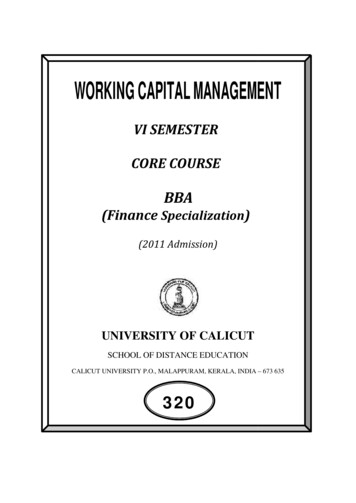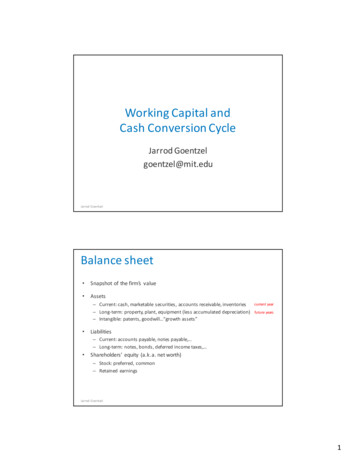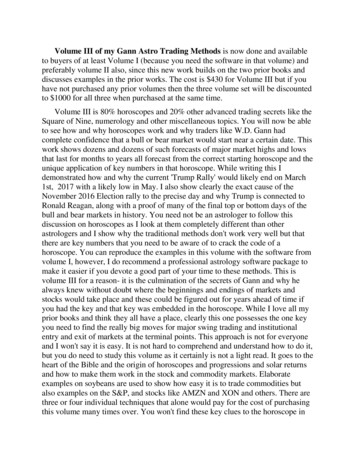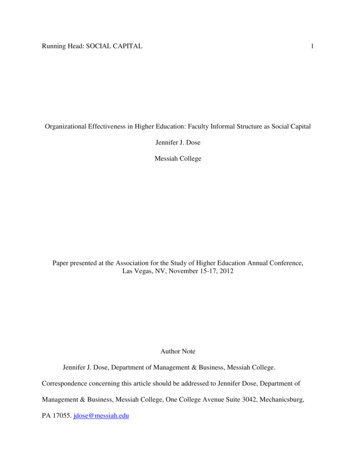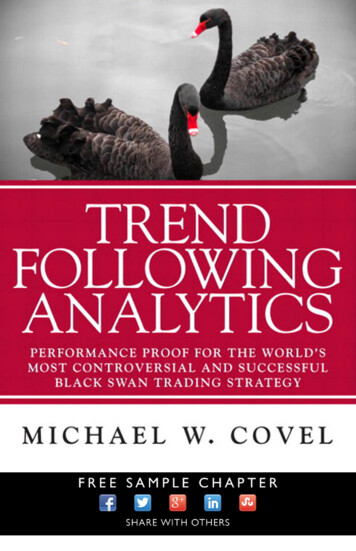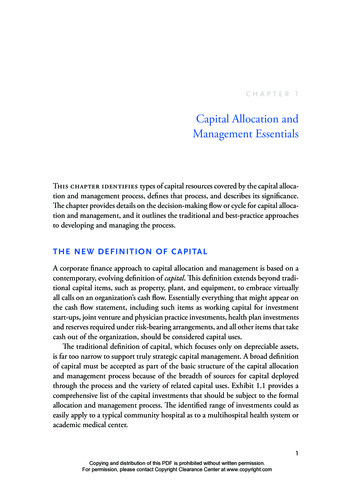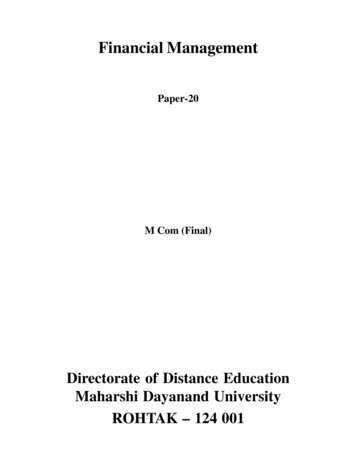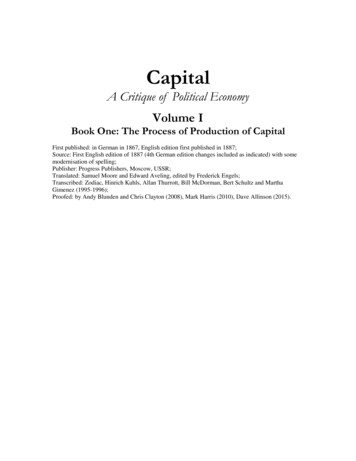
Transcription
CapitalA Critique of Political EconomyVolume IBook One: The Process of Production of CapitalFirst published: in German in 1867, English edition first published in 1887;Source: First English edition of 1887 (4th German edition changes included as indicated) with somemodernisation of spelling;Publisher: Progress Publishers, Moscow, USSR;Translated: Samuel Moore and Edward Aveling, edited by Frederick Engels;Transcribed: Zodiac, Hinrich Kuhls, Allan Thurrott, Bill McDorman, Bert Schultz and MarthaGimenez (1995-1996);Proofed: by Andy Blunden and Chris Clayton (2008), Mark Harris (2010), Dave Allinson (2015).
Table of ContentsPreface to the First German Edition (Marx, 1867) . 6Preface to the French Edition (Marx, 1872) . 9Afterword to the Second German Edition (1873). 10Afterword to the French Edition (1875) . 16Preface to the Third German Edition (1883) . 17Preface to the English Edition (Engels, 1886) . 19Preface to the Fourth German Edition (Engels, 1890) . 22Part 1: Commodities and Money . 26Chapter 1: Commodities . 27Section 1: The Two Factors of a Commodity: Use-Value and Value (The Substance of Valueand the Magnitude of Value) . 27Section 2: The Two-fold Character of the Labour Embodied in Commodities. 30Section 3: The Form of Value or Exchange-Value . 33Section 4: The Fetishism of Commodities and the Secret Thereof . 47Chapter 2: Exchange. 60Chapter 3: Money, Or the Circulation of Commodities . 67Section 1: The Measure of Values. 67Section 2: The Medium of Circulation . 71Section 3: Money. 84Part 2: Transformation of Money into Capital. 103Chapter 4: The General Formula for Capital . 104Chapter 5: Contradictions in the General Formula of Capital . 111Chapter 6: The Buying and Selling of Labour-Power . 119Part 3: The Production of Absolute Surplus-Value . 126Chapter 7: The Labour-Process and the Process of Producing Surplus-Value. 127Section 1: The Labour-Process or the Production of Use-Values . 127Section 2: The Production of Surplus-Value . 131Chapter 8: Constant Capital and Variable Capital. 142Chapter 9: The Rate of Surplus-Value . 150Section 1: The Degree of Exploitation of Labour-Power . 150Section 2: The Representation of the Components of the Value of the Product byCorresponding Proportional Parts of the Product Itself. 154Section 3: Senior’s “Last Hour” . 156Section 4: Surplus-Produce . 159Chapter 10: The Working day . 162Section 1: The Limits of the Working day . 162Section 2: The Greed for Surplus-Labor, Manufacturer and Boyard . 164Section 3: Branches of English Industry Without Legal Limits to Exploitation . 168Section 4: Day and Night Work. The Relay System . 175
Section 5: The Struggle for a Normal Working Day. Compulsory Laws for the Extension ofthe Working Day from the Middle of the 14th to the End of the 17th Century . 178Section 6: The Struggle for a Normal Working Day. Compulsory Limitation by Law of theWorking-Time. English Factory Acts, 1833 . 184Section 7: The Struggle for a Normal Working Day. Reaction of the English Factory Actson Other Countries . 194Chapter 11: Rate and Mass of Surplus-Value . 213Part 4: Production of Relative Surplus-Value . 219Chapter 12: The Concept of Relative Surplus-Value . 220Chapter 13: Co-operation . 227Chapter 14: Division of Labour and Manufacture. 237Section 1: Two-Fold Origin of Manufacture . 237Section 2: The Detail Labourer and his Implements . 238Section 3: The Two Fundamental Forms of Manufacture: Heterogeneous Manufacture,Serial Manufacture . 240Section 4: Division of Labour in Manufacture, and Division of Labour in Society. 244Section 5: The Capitalistic Character of Manufacture . 248Chapter 15: Machinery and Modern Industry . 261Section 1 : The Development of Machinery. 261Section 2: The Value Transferred by Machinery to the Product . 268Section 3: The Proximate Effects of Machinery on the Workman . 271Section 4: The Factory. 284Section 5: The Strife Between Workman and Machine . 287Section 6: The Theory of Compensation as Regards the Workpeople Displaced byMachinery . 293Section 7: Repulsion and Attraction of Workpeople by the Factory System. Crises in theCotton Trade . 298Section 8: Revolution Effected in Manufacture, Handicrafts, and Domestic Industry byModern Industry . 304Section 9: The Factory Acts. Sanitary and Educational Clauses of the same. Their GeneralExtension in England. 315Section 10: Modern Industry and Agriculture . 329Part 5: Production of Absolute and Relative Surplus-Value . 358Chapter 16: Absolute and Relative Surplus-Value . 359Chapter 17: Changes of Magnitude in the Price of Labour-Power and in Surplus-Value. 367Section 1: Length of the Working day and Intensity of Labour Constant. Productiveness ofLabour Variable . 367Section 2: Working day Constant. Productiveness of Labour Constant. Intensity of LabourVariable . 370Section 3: Productiveness and Intensity of Labour Constant. Length of the Working dayVariable . 370
Section 4: Simultaneous Variations in the Duration, Productiveness, and Intensity of Labour. 372Chapter 18: Various Formula for the rate of Surplus-Value . 375Part 6: Wages . 378Chapter 19: The Transformation of the Value (and Respective Price) of Labour-Power intoWages . 379Chapter 20: Time-Wages . 384Chapter 21: Piece Wages . 390Chapter 22: National Differences of Wages . 396Part 7: The Accumulation of Capital. 400Chapter 23: Simple Reproduction . 401Chapter 24: Conversion of Surplus-Value into Capital . 410Section 1: Capitalist Production on a Progressively Increasing Scale. Transition of the Lawsof Property that Characterise Production of Commodities into Laws of CapitalistAppropriation . 410Section 2: Erroneous Conception, by Political Economy, of Reproduction on a ProgressivelyIncreasing Scale . 415Section 3: Separation of Surplus-value into Capital and Revenue. The Abstinence Theory. 417Section 4: Circumstances that, Independently of the Proportional Division of Surplus-valueinto Capital and Revenue, Determine the Amount of Accumulation. Degree of Exploitationof Labour-Power. Productivity of Labour. Growing Difference in Amount Between CapitalEmployed and Capital Consumed. Magnitude of Capital Advanced . 421Section 5: The So-Called Labour Fund . 426Chapter 25: The General Law of Capitalist Accumulation . 434Section 1: The Increased Demand for labour power that Accompanies Accumulation, theComposition of Capital Remaining the same . 434Section 2: Relative Diminution of the Variable Part of Capital Simultaneously with theProgress of Accumulation and of the Concentration that Accompanies it . 438Section 3: Progressive Production of a Relative surplus population or Industrial ReserveArmy . 442Section 4: Different Forms of the Relative surplus population. The General Law ofCapitalistic Accumulation . 449Section 5: Illustrations of the General Law of Capitalist Accumulation . 453Part 8: Primitive Accumulation . 506Chapter 26: The Secret of Primitive Accumulation . 507Chapter 27: Expropriation of the Agricultural Population From the Land. 510Chapter 28: Bloody Legislation Against the Expropriated, from the End of the 15th Century.Forcing Down of Wages by Acts of Parliament . 522Chapter 29: Genesis of the Capitalist Farmer . 528Chapter 30: Reaction of the Agricultural Revolution on Industry. Creation of the Home-Marketfor Industrial Capital. 530Chapter 31: The Genesis of the Industrial Capitalist . 533
Chapter 32: Historical Tendency of Capitalist Accumulation. 541Chapter 33: The Modern Theory of Colonisation1 . 543
Preface to the First German Edition (Marx, 1867)The work, the first volume of which I now submit to the public, forms the continuation of my ZurKritik der Politischen Oekonomie (A Contribution to the Criticism of Political Economy)published in 1859. The long pause between the first part and the continuation is due to an illnessof many years’ duration that again and again interrupted my work.The substance of that earlier work is summarised in the first three chapters of this volume. This isdone not merely for the sake of connexion and completeness. The presentation of the subjectmatter is improved. As far as circumstances in any way permit, many points only hinted at in theearlier book are here worked out more fully, whilst, conversely, points worked out fully there areonly touched upon in this volume. The sections on the history of the theories of value and ofmoney are now, of course, left out altogether. The reader of the earlier work will find, however,in the notes to the first chapter additional sources of reference relative to the history of thosetheories.Every beginning is difficult, holds in all sciences. To understand the first chapter, especially thesection that contains the analysis of commodities, will, therefore, present the greatest difficulty.That which concerns more especially the analysis of the substance of value and the magnitude ofvalue, I have, as much as it was possible, popularised. 1 The value-form, whose fully developedshape is the money-form, is very elementary and simple. Nevertheless, the human mind has formore than 2,000 years sought in vain to get to the bottom of it all, whilst on the other hand, to thesuccessful analysis of much more composite and complex forms, there has been at least anapproximation. Why? Because the body, as an organic whole, is more easy of study than are thecells of that body. In the analysis of economic forms, moreover, neither microscopes norchemical reagents are of use. The force of abstraction must replace both. But in bourgeois society,the commodity-form of the product of labour – or value-form of the commodity – is the economiccell-form. To the superficial observer, the analysis of these forms seems to turn upon minutiae. Itdoes in fact deal with minutiae, but they are of the same order as those dealt with in microscopicanatomy.With the exception of the section on value-form, therefore, this volume cannot stand accused onthe score of difficulty. I presuppose, of course, a reader who is willing to learn something newand therefore to think for himself.The physicist either observes physical phenomena where they occur in their most typical formand most free from disturbing influence, or, wherever possible, he makes experiments underconditions that assure the occurrence of the phenomenon in its normality. In this work I have toexamine the capitalist mode of production, and the conditions of production and exchangecorresponding to that mode. Up to the present time, their classic ground is England. That is thereason why England is used as the chief illustration in the development of my theoretical ideas. If,however, the German reader shrugs his shoulders at the condition of the English industrial andagricultural labourers, or in optimist fashion comforts himself with the thought that in Germanythings are not nearly so bad; I must plainly tell him, “De te fabula narratur!” [It is of you that thestory is told. – Horace]Intrinsically, it is not a question of the higher or lower degree of development of the socialantagonisms that result from the natural laws of capitalist production. It is a question of theselaws themselves, of these tendencies working with iron necessity towards inevitable results. The
7Preface to the First German Edition (Marx 1867)country that is more developed industrially only shows, to the less developed, the image of itsown future.But apart from this. Where capitalist production is fully naturalised among the Germans (forinstance, in the factories proper) the condition of things is much worse than in England, becausethe counterpoise of the Factory Acts is wanting. In all other spheres, we, like all the rest ofContinental Western Europe, suffer not only from the development of capitalist production, butalso from the incompleteness of that development. Alongside the modern evils, a whole series ofinherited evils oppress us, arising from the passive survival of antiquated modes of production,with their inevitable train of social and political anachronisms. We suffer not only from theliving, but from the dead. Le mort saisit le vif! [The dead holds the living in his grasp. – formulaof French common law]The social statistics of Germany and the rest of Continental Western Europe are, in comparisonwith those of England, wretchedly compiled. But they raise the veil just enough to let us catch aglimpse of the Medusa head behind it. We should be appalled at the state of things at home, if, asin England, our governments and parliaments appointed periodically commissions of inquiry intoeconomic conditions; if these commissions were armed with the same plenary powers to get atthe truth; if it was possible to find for this purpose men as competent, as free from partisanshipand respect of persons as are the English factory-inspectors, her medical reporters on publichealth, her commissioners of inquiry into the exploitation of women and children, into housingand food. Perseus wore a magic cap down over his eyes and ears as a make-believe that there areno monsters.Let us not deceive ourselves on this. As in the 18th century, the American war of independencesounded the tocsin for the European middle class, so that in the 19th century, the American CivilWar sounded it for the European working class. In England the process of social disintegration ispalpable. When it has reached a certain point, it must react on the Continent. There it will take aform more brutal or more humane, according to the degree of development of the working classitself. Apart from higher motives, therefore, their own most important interests dictate to theclasses that are for the nonce the ruling ones, the removal of all legally removable hindrances tothe free development of the working class. For this reason, as well as others, I have given so largea space in this volume to the history, the details, and the results of English factory legislation.One nation can and should learn from others. And even when a society has got upon the righttrack for the discovery of the natural laws of its movement – and it is the ultimate aim of thiswork, to lay bare the economic law of motion of modern society – it can neither clear by boldleaps, nor remove by legal enactments, the obstacles offered by the successive phases of itsnormal development. But it can shorten and lessen the birth-pangs.To prevent possible misunderstanding, a word. I paint the capitalist and the landlord in no sensecouleur de rose [i.e., seen through rose-tinted glasses]. But here individuals are dealt with only inso far as they are the personifications of economic categories, embodiments of particular classrelations and class-interests. My standpoint, from which the evolution of the economic formationof society is viewed as a process of natural history, can less than any other make the individualresponsible for relations whose creature he socially remains, however much he may subjectivelyraise himself above them.In the domain of Political Economy, free scientific inquiry meets not merely the same enemies asin all other domains. The peculiar nature of the materials it deals with, summons as foes into thefield of battle the most violent, mean and malignant passions of the human breast, the Furies ofprivate interest. The English Established Church, e.g., will more readily pardon an attack on 38 ofits 39 articles than on 1/39 of its income. Now-a-days atheism is culpa levis [a relatively slight
8Preface to the First German Edition (Marx 1867)sin, c.f. mortal sin], as compared with criticism of existing property relations. Nevertheless, thereis an unmistakable advance. I refer, e.g., to the Blue book published within the last few weeks:“Correspondence with Her Majesty’s Missions Abroad, regarding Industrial Questions andTrades’ Unions.” The representatives of the English Crown in foreign countries there declare inso many words that in Germany, in France, to be brief, in all the civilised states of the EuropeanContinent, radical change in the existing relations between capital and labour is as evident andinevitable as in England. At the same time, on the other side of the Atlantic Ocean, Mr. Wade,vice-president of the United States, declared in public meetings that, after the abolition of slavery,a radical change of the relations of capital and of property in land is next upon the order of theday. These are signs of the times, not to be hidden by purple mantles or black cassocks. They donot signify that tomorrow a miracle will happen. They show that, within the ruling classesthemselves, a foreboding is dawning, that the present society is no solid crystal, but an organismcapable of change, and is constantly changing.The second volume of this book will treat of the process of the circulation of capital (Book II.),and of the varied forms assumed by capital in the course of its development (Book III.), the thirdand last volume (Book IV.), the history of the theory.Every opinion based on scientific criticism I welcome. As to prejudices of so-called publicopinion, to which I have never made concessions, now as aforetime the maxim of the greatFlorentine is mine:“Segui il tuo corso, e lascia dir le genti.”[Follow your own course, and let people talk – paraphrased from Dante]Karl MarxLondonJuly 25, 18671This is the more necessary, as even the section of Ferdinand Lassalle’s work against SchulzeDelitzsch, in which he professes to give “the intellectual quintessence” of my explanations on thesesubjects, contains important mistakes. If Ferdinand Lassalle has borrowed almost literally from mywritings, and without any acknowledgement, all the general theoretical propositions in his economicworks, e.g., those on the historical character of capital, on the connexion between the conditions ofproduction and the mode of production, &c., &c., even to the terminology created by me, this mayperhaps be due to purposes of propaganda. I am here, of course, not speaking of his detailed workingout and application of these propositions, with which I have nothing to do.
Preface to the French Edition (Marx, 1872)To the citizen Maurice LachâtreDear Citizen,I applaud your idea of publishing the translation of “Das Kapital” as a serial. In this form thebook will be more accessible to the working class, a consideration which to me outweighseverything else.That is the good side of your suggestion, but here is the reverse of the medal: the method ofanalysis which I have employed, and which had not previously been applied to economicsubjects, makes the reading of the first chapters rather arduous, and it is to be feared that theFrench public, always impatient to come to a conclusion, eager to know the connexion betweengeneral principles and the immediate questions that have aroused their passions, may bedisheartened because they will be unable to move on at once.That is a disadvantage I am powerless to overcome, unless it be by forewarning and forearmingthose readers who zealously seek the truth. There is no royal road to science, and only those whodo not dread the fatiguing climb of its steep paths have a chance of gaining its luminous summits.Believe me,dear citizen,Your devoted,Karl MarxLondonMarch 18, 1872
Afterword to the Second German Edition (1873)I must start by informing the readers of the first edition about the alterations made in the secondedition. One is struck at once by the clearer arrangement of the book. Additional notes areeverywhere marked as notes to the second edition. The following are the most important pointswith regard to the text itself:In Chapter I, Section 1, the derivation of value from an analysis of the equations by which everyexchange-value is expressed has been carried out with greater scientific strictness; likewise theconnexion between the substance of value and the determination of the magnitude of value bysocially necessary labour-time, which was only alluded to in the first edition, is now expresslyemphasised. Chapter I, Section 3 (the Form of Value), has been completely revised, a task whichwas made necessary by the double exposition in the first edition, if nothing else. – Let me remark,in passing, that that double exposition had been occasioned by my friend, Dr. L Kugelmann inHanover. I was visiting him in the spring of 1867 when the first proof-sheets arrived fromHamburg, and he convinced me that most readers needed a supplementary, more didacticexplanation of the form of value. – The last section of the first chapter, “The Fetishism ofCommodities, etc.,” has largely been altered. Chapter III, Section I (The Measure of Value), hasbeen carefully revised, because in the first edition this section had been treated negligently, thereader having been referred to the explanation already given in “Zur Kritik der PolitischenOekonomie,” Berlin 1859. Chapter VII, particularly Part 2 [Eng. ed., Chapter IX, Section 2], hasbeen re-written to a great extent.It would be a waste of time to go into all the partial textual changes, which were often purelystylistic. They occur throughout the book. Nevertheless I find now, on revising the Frenchtranslation appearing in Paris, that several parts of the German original stand in need of ratherthorough remoulding, other parts require rather heavy stylistic editing, and still others painstakingelimination of occasional slips. But there was no time for that. For I had been informed only inthe autumn of 1871, when in the midst of other urgent work, that the book was sold out and thatthe printing of the second edition was to begin in January of 1872.The appreciation which “Das Kapital” rapidly gained in wide circles of the German working classis the best reward of my labours. Herr Mayer, a Vienna manufacturer, who in economic mattersrepresents the bourgeois point of view, in a pamphlet published during the Franco-German Waraptly expounded the idea that the great capacity for theory, which used to be considered ahereditary German possession, had almost completely disappeared amongst the so-callededucated classes in Germany, but that amongst its working class, on the contrary, that capacitywas celebrating its revival.To the present moment Political Economy, in Germany, is a foreign science. Gustav von Gulichin his “Historical description of Commerce, Industry,” &c., 1 especially in the two first volumespublished in 1830, has examined at length the historical circumstances that prevented, inGermany, the development of the capitalist mode of production, and consequently thedevelopment, in that country, of modern bourgeois society. Thus the soil whence PoliticalEconomy springs was wanting. This “science” had to be imported from England and France as aready-made article; its German professors remained schoolboys. The theoretical expression o
and most free from disturbing influence, or, wherever possible, he makes experiments under conditions that assure the occurrence of the phenomenon in its normality. In this work I have to examine the capitalist mode of production, and the conditio



